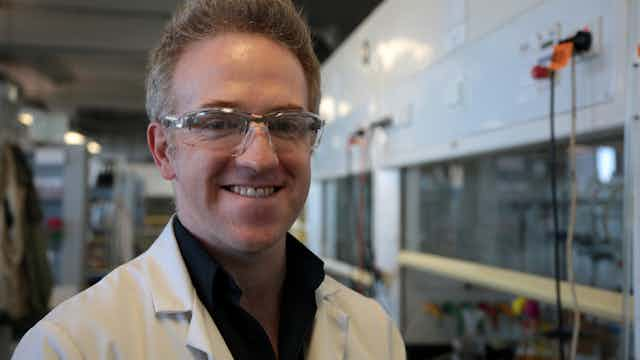Dr Matthew Todd – leader of the Open Source Malaria consortium in Sydney, senior lecturer at the University of Sydney and Conversation author – was awarded one of three Accelerating Science Awards in Washington DC yesterday.
At an Open Access Week event, Dr Todd’s work turning publicly available data into an openly accessible worldwide repository was recognised by an award and US$30,000 prize.
The annual Accelerating Science Awards Program honours researchers who have used, applied or remixed scientific research, and published through open access to make a difference in science, medicine, business, technology or society as a whole.
The Open Source Malaria project incorporates students and researchers from Australia, Europe and North America who use open online laboratory notebooks.
Its experimental data is posted online each day, enabling instant sharing and the ability to build on others’ findings in almost real time.
Such a large-scale and open collaborative research model could be used to study other diseases, such as Alzheimer’s.
“This recognition [the award] may help enlist more people into the collaborative effort to fight malaria,” Dr Todd said. “If we succeed with these efforts, the approach could be extended to fighting other diseases – such as cancer.”
In an interview with PLOS Blogs, Dr Todd said he first became engaged in open research when he saw problems not being solved efficiently, and recognised the internet’s potential to facilitate collaboration.
“Putting your work on the web helps to get greater interaction and find the best people to work with you,” he said.
The Open Source Malaria project built upon an earlier project that looked at improving drug manufacture.
“We thought ‘how about extending this to drug discovery?’” Dr Todd said.

“The [Open Source Malaria] project lets people see the process and that might get people more interested in what science is: there’s nothing mysterious about it, just people doing work.
"Generally though, there is a fair amount of pressure on the project – we need to get it right because we don’t want the project to become the example of open science not working!”
A panel of judges – including co-recipient of the 1989 Nobel Prize in Physiology or Medicine Harold Varmus – selected three award recipients from a finalist list of six.
Two further awards went to:
- Nitika Pant Pai, Caroline Vadnais, Roni Deli-Houssein and Sushmita Shivkumar from McGill University and McGill Univeristy Health Centre, Montreal, for their work in developing an online HIV risk test
- Daniel Mietchen, Raphael Wimmer and Nils Dagsson Moskopp from the Humboldt Museum, University of Regensberg and Humboldt University of Berlin for their Open Access Media Importer, a bot that downloads multimedia files from open access literature and arranges them in Wikimedia Commons.
Honourable mentions went to:
- Ralf Buckley and his team from the International Cantre for Ecotourism Research in Queensland for devising a method to calculate the value of ecotourism for endangered animals
- Mark Costello, a marine ecologist at the University of Auckland, who manages the open access World Register of Marine Species (WoRMS), the largest real-time collaboration of taxonomic experts and marine biologists in the the world
- Saber Iftekhar Khan, Eva Schmid and Oliver Hoeller for developing a student-ready mobile phone microscope.

